 Petzlover
Petzlover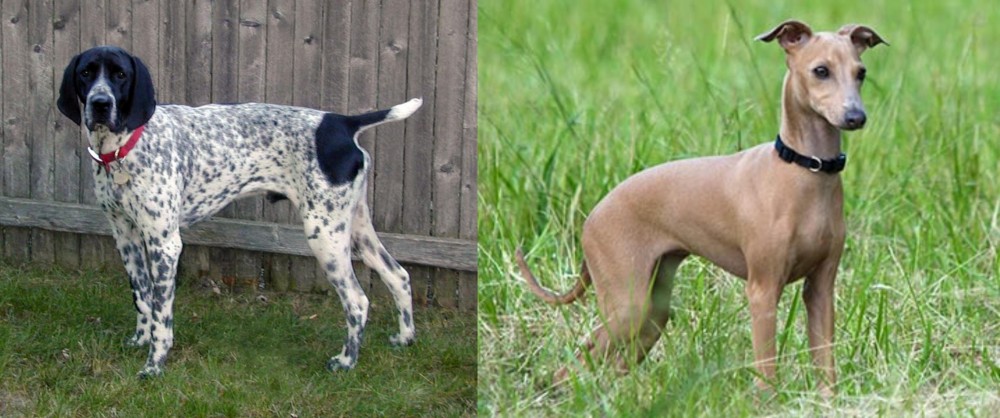 Braque d'Auvergne is originated from France but Italian Greyhound is originated from Italy. Braque d'Auvergne may grow 27 cm / 11 inches higher than Italian Greyhound. Braque d'Auvergne may weigh 55 kg / 122 pounds more than Italian Greyhound. Both Braque d'Auvergne and Italian Greyhound has same life span. Braque d'Auvergne may have more litter size than Italian Greyhound. Both Braque d'Auvergne and Italian Greyhound requires Low Maintenance.
Braque d'Auvergne is originated from France but Italian Greyhound is originated from Italy. Braque d'Auvergne may grow 27 cm / 11 inches higher than Italian Greyhound. Braque d'Auvergne may weigh 55 kg / 122 pounds more than Italian Greyhound. Both Braque d'Auvergne and Italian Greyhound has same life span. Braque d'Auvergne may have more litter size than Italian Greyhound. Both Braque d'Auvergne and Italian Greyhound requires Low Maintenance.
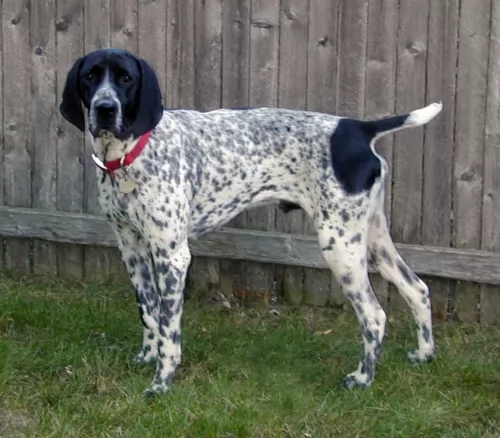 Sometime over 5 centuries ago, in the Cantal Region of France, was born a hunting breed, that might be the real ancestor of today’s pointing hunter dogs. Perhaps the oldest of all pointing gun dog is the Braque d’Auvergne. This breed comes from Central France in the region of Auvergne. This breed was developed prior to written dog breeding records in order to hunt in this region and find, point, flush out and retrieve fowl. This breed is clearly one of if not the oldest breeds in the French Braque. There is no agreement among historians on what breed is the oldest of the European pointing dogs and where they were developed – was it Spain or was it France? It is thought that the Braque Francais Gascogne is the original one of these in the early 1600’s while the Braque d’Auvergne came soon after. Due to the different hunting needs in the different parts of France, the Braque Francais Gascogne was crossed with a lot of other local scent hounds. The Braque d’Auvergne is one of the very oldest of all of these. There are records of the breeds existence in the 1700’s. It is probable that the Braque d’Auvergne was developed by crossing local dogs with Gascogne as well as with the Petit Bleu de Gascogne and the Grand Bleu de Gascogne.
Sometime over 5 centuries ago, in the Cantal Region of France, was born a hunting breed, that might be the real ancestor of today’s pointing hunter dogs. Perhaps the oldest of all pointing gun dog is the Braque d’Auvergne. This breed comes from Central France in the region of Auvergne. This breed was developed prior to written dog breeding records in order to hunt in this region and find, point, flush out and retrieve fowl. This breed is clearly one of if not the oldest breeds in the French Braque. There is no agreement among historians on what breed is the oldest of the European pointing dogs and where they were developed – was it Spain or was it France? It is thought that the Braque Francais Gascogne is the original one of these in the early 1600’s while the Braque d’Auvergne came soon after. Due to the different hunting needs in the different parts of France, the Braque Francais Gascogne was crossed with a lot of other local scent hounds. The Braque d’Auvergne is one of the very oldest of all of these. There are records of the breeds existence in the 1700’s. It is probable that the Braque d’Auvergne was developed by crossing local dogs with Gascogne as well as with the Petit Bleu de Gascogne and the Grand Bleu de Gascogne.
In all of Western Europe, the region of Auvergne is not very populated and has unique geography in that is hilly and has many extinct and eroded volcanoes. A lot of the region is still unpopulated. In this environment, wildlife has flourished, and hunting is successful in providing food for the regions people. This circumstance with an abundance of birds, led to the breeding of the Braque Auvergne to specialize in hunting in this area. The breed is not very popular outside of Auvergne and probably never was. That fact allowed them to be devastated by the Second World War. The Reunion des Amateurs de Braque d’Auvergne (RABA) was started to promote the pure breeding and the protection of the d’Auvergnes. But when Auvergnes was occupied during the war, the slowed breeding of the Braque d ‘ Auvergne almost eliminated the breed. There might have only been about 25 dogs left following the end of the war. These remaining dogs were used to revive the breed, but it is still uncommon, but not rare. Individuals have been imported by other countries including North America. The United Kennel Club (UKC) accepted the breed in 2006 but is not accepted by the AKC (American Kennel Club). The breed is still a working breed and outside of France, very rare.
 The Italian Greyhound is an ancient breed, a purebred originating in Italy but with evidence to suggest it was also to be found in Turkey and Greece.
The Italian Greyhound is an ancient breed, a purebred originating in Italy but with evidence to suggest it was also to be found in Turkey and Greece.
It's a small breed dog that became popular with Italian royalty in the 16th century. Over the centuries, the dog's appearance has remain unchanged, although breeders tried to make it even smaller, leading to problems with the health of the dog.
Towards the end of the 1800s, it was fortunate that breed fanciers implemented breeding programs to restore the dog's look's and strength. The American Kennel Club registered the Italian Greyhound in 1886. Today the dog is a wonderful companion dog.
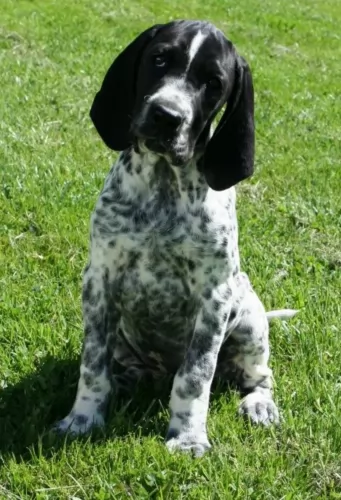 The Braque d’Auvergne is a well built, strong hunting dog with long ears, a large head and a docked tail. His coat is white with black markings and black ears and head. The breed looks a lot like all the other pointing dogs from France. They are medium in stature and has the appearance of a working gundog. He is athletic, muscular and fit. Docking the tail is outlawed in many countries and all of the United Kingdom. In that case the tail is high on the rump and always straight. Their face and head are big for the size of the body and shaped like an oval. With a long muzzle, deep set eyes and a gentle expression, they are kindly and handsome dogs. Their skin is loose but not droopy or wrinkled like hound dogs.
The Braque d’Auvergne is a well built, strong hunting dog with long ears, a large head and a docked tail. His coat is white with black markings and black ears and head. The breed looks a lot like all the other pointing dogs from France. They are medium in stature and has the appearance of a working gundog. He is athletic, muscular and fit. Docking the tail is outlawed in many countries and all of the United Kingdom. In that case the tail is high on the rump and always straight. Their face and head are big for the size of the body and shaped like an oval. With a long muzzle, deep set eyes and a gentle expression, they are kindly and handsome dogs. Their skin is loose but not droopy or wrinkled like hound dogs.
 The sweet Italian Greyhound is much like the regular Greyhound, just smaller but every bit as sleek, elegant and fine-boned. He stands at between 33 and 38cm at the withers and weighs just 3 to 7kg. He is slender and elegant.
The sweet Italian Greyhound is much like the regular Greyhound, just smaller but every bit as sleek, elegant and fine-boned. He stands at between 33 and 38cm at the withers and weighs just 3 to 7kg. He is slender and elegant.
He has long, fine-boned legs and his short, smooth coat makes him easy to groom too. The coat comes in a number of colors such as fawn, tan, grey, reddish, chocolate and black.
Described as sweet, intelligent and playful, the Italian Greyhound adapts easily to life in the city or to country life.
He is easy to train too, and even though he is small and amicable, it is still a good idea to have him trained and socialized as he is just a simple pleasure to have around then. He just loves the company of his human family and becomes a gentle friend to other dogs, to children in the home and to the elderly.
He is a frail toy dog, and he needs to be constantly watched over that he isn’t handled roughly by disrespectful children or from bigger pets. He is an active breed and will love to be played with and join you on your walks. Even though he is such a frail, fragile looking dog, he has a feisty, stubborn, defiant side to him and that is why training and socialization becomes important. He will be reserved around strangers.
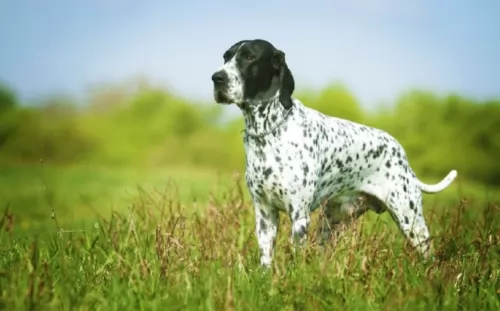 This is a gentle, adaptable and obedient breed. With their intelligence and affectionate nature, they make great family dogs and are eager to please their people. Living with other dogs is fine but not with small, prey size animals. The Braque d’Auvergne should never be left alone pets like gerbils and hamsters. They must be socialized to cats as pets and not prey before living with them successfully. They need to work closely with one human partner. They are first and foremost a hunting dog and need some sort of hunting simulation. They are devoted to their families and want to be constantly in their presence. This can lead to separation anxiety if they are left alone too much. They are great with children and need a family.
This is a gentle, adaptable and obedient breed. With their intelligence and affectionate nature, they make great family dogs and are eager to please their people. Living with other dogs is fine but not with small, prey size animals. The Braque d’Auvergne should never be left alone pets like gerbils and hamsters. They must be socialized to cats as pets and not prey before living with them successfully. They need to work closely with one human partner. They are first and foremost a hunting dog and need some sort of hunting simulation. They are devoted to their families and want to be constantly in their presence. This can lead to separation anxiety if they are left alone too much. They are great with children and need a family.
 If you’re looking for a sweet, gentle canine friend, the Italian Greyhound promises to be just that. They just crave human companionship and are eager to please.
If you’re looking for a sweet, gentle canine friend, the Italian Greyhound promises to be just that. They just crave human companionship and are eager to please.
He isn’t the ideal playmate for children, simply because he is frail and can get hurt easily in rough play.
Small he may be, but he is intelligent and alert, and he will bark to warn you of strangers. They are essentially indoor dogs, and when you bring one of them into your home, you’ll be rewarded with a devoted, loving and loyal canine friend.
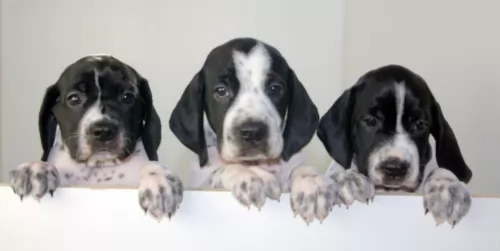 The Braque d’Auvergne is a healthy breed but can face some of the same health concerns as other pointers and hunting dogs. The long, droopy ears can get infected easily if wet and need to be cleaned regularly so that food or dirt are not trapped their either. Because of the small gene pool however they may be at risk for several issues. The breeders in France express concerns about possible hip dysplasia and testing is highly recommended. Because they are at risk for other conditions that might not show up until later in life, it is also recommended that they be tested by the Canine Eye Registration Foundation (CERF) as well as the Orthopedic Foundation for Animals (OFA).
The Braque d’Auvergne is a healthy breed but can face some of the same health concerns as other pointers and hunting dogs. The long, droopy ears can get infected easily if wet and need to be cleaned regularly so that food or dirt are not trapped their either. Because of the small gene pool however they may be at risk for several issues. The breeders in France express concerns about possible hip dysplasia and testing is highly recommended. Because they are at risk for other conditions that might not show up until later in life, it is also recommended that they be tested by the Canine Eye Registration Foundation (CERF) as well as the Orthopedic Foundation for Animals (OFA).
 Your small Italian Greyhound isn’t a sickly dog breed, and in fact, with the right care, he can live to be between 10 to 14 years of age.
Your small Italian Greyhound isn’t a sickly dog breed, and in fact, with the right care, he can live to be between 10 to 14 years of age.
As with any dog breed however, there will be some more common conditions to watch for in the Italian Greyhound. Some of these are epilepsy, hyperthyroidism and periodontal disease.
There are different types and causes of seizures, and there are actually no definitive tests for epilepsy. One seizure isn’t enough to make a diagnosis and more than one seizure is usually recorded before a diagnosis can be made and treatment prescribed.
These treatments don’t cure Epilepsy but rather control the symptoms and keep the dog seizure-free so that they can have a normal life.
Seizures are not all the same – some are life-threatening and advice from the internet can’t be looked upon as adequate. With a dangerous disease such as epilepsy, excellent and qualified veterinary help will be required.
Gum disease can be terrible for your pet. Apart from bone loss and loss of teeth, your pet will experience pain. Periodontal disease may well be common in dogs, but it can be prevented.
Once an animal has eaten food, particles of food, saliva and bacteria form plaque over the teeth and this doesn’t only cause damage to the teeth but to the entire immune system.
This disease can cause inflamed gums and loss of teeth. It is important to brush your pet’s teeth with special canine toothbrush and toothpaste.
The truth is, periodontal disease can cause more problems than just tooth pain which is bad enough. Dogs with gum inflammation may be at higher risk for heart- and kidney disease too. If you’re worried about your dog, take him in to your vet for an oral examination and teeth cleaning.
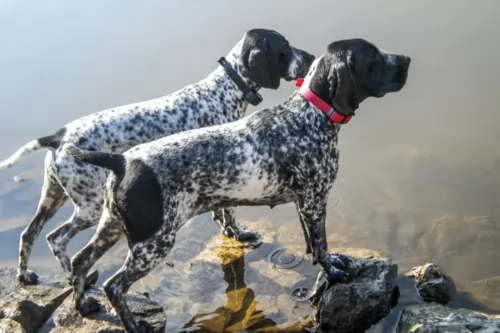 The Braque d’Auvergne needs a high-quality diet fit for a working dog but not too much to make him obese. They are an active breed to choose a formula that is designed for working dogs.
The Braque d’Auvergne needs a high-quality diet fit for a working dog but not too much to make him obese. They are an active breed to choose a formula that is designed for working dogs.
Although no studies have been conducted on the Braque d’Auvergne’s health issues there are many conditions that similar breeds are susceptible to and the d’Auvergne might be as well. This includes any of the following:
This is an active, working dog who needs a lot of stimulation and exercise. The only real appropriate exercise for these dogs is hunting or outings in the woods. He not only needs the exercise, but he also needs to stimulate his sense of smell and his gundog intelligence. He might excel in lure chase or even a form or barn hunt. They certainly could excel at obedience trials and perhaps rally. If you are a weekend hunter then this is the ideal dog for you. They are so easy to train that they surpass other pointers for success with casual hunters. They hunt at a slower pace than many other gundogs. Their intelligence and athleticism lend itself well to agility and flyball also. They need a large (+acres)fenced in area to run and play.
 The Italian Greyhound has a short, smooth, satin-type coat which is easy to maintain. Gently brush him once or twice a week, being careful not to press down hard as he has frail, bambi-like legs.
The Italian Greyhound has a short, smooth, satin-type coat which is easy to maintain. Gently brush him once or twice a week, being careful not to press down hard as he has frail, bambi-like legs.
He also sheds little, making him a low maintenance breed. Because of the short coat, take particular care of him in the Winter and don’t allow him to become overly cold.
Your Italian Greyhound will require a diet rich in nutritional value, and if your particular dog is quite active you will need to feed him about 450 calories a day and sometimes more.
Each dog is an individual and will have different dietary needs. If you feed your pet a top quality commercially manufactured food, read the packaging for guidance on food portion sizes.
Speak to your vet if you are unsure how to feed your dog so that his food and the amounts you feed him contribute to his good health. He must always have access to fresh, cool water.